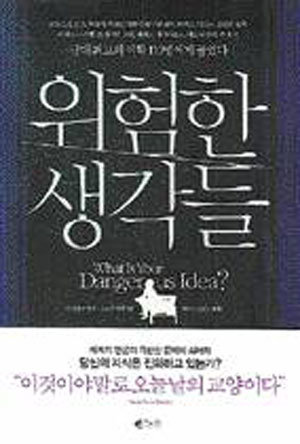Dangerous Ideas from 110 Great Scholars
Dangerous Ideas from 110 Great Scholars
Posted September. 01, 2007 18:44,

Richard Dawkins, the author of The Selfish Gene, and The God Delusion; Steven Pinker who wrote Blank Slate; and Richard Nisbett, the writer of The Geography of Thought are three of the world-class scientific writers. For those who have read the above-mentioned books and wondered what further progress those scientists have made, the newly released book titled What Is Your Dangerous Idea? provides the answer.
The book includes 110 scholars dangerous ideas. What constitutes a dangerous idea? John Brockman, the author of this eye-catching book, says, Thoughts that run counter to contemporary values and morality, and that have the power to change the world, are dangerous: not because they are wrong, but because they are right.
John Brockman is the founder of the nonprofit Edge Foundation, which is a venue for the worlds scientists and thinkers to discuss their academic achievements. He gave three or four pages to each of 110 scholars. They elucidated their dangerous ideas, which encompass psychology, biology, robotics, cognitive science, economics, and genetics.
From a moral perspective, Dawkinss argument that punishment should be imposed on criminal genes rather than criminals themselves sounds dangerous. What he means is that we should first examine biological and heretical factors that lead people to commit crimes. But his idea negates todays criminal law. He likens a criminal to a broken-down car, and insists we should not whip the car without fixing it and changing its parts.
Evolutionary psychologist David Buss says that human beings have adapted themselves to ruthless evolutionary processes for survival and propagation, and that murder is the most effective way to secure resources essential for propagation. He based his argument on the following: we still consider things that hamper the evolution of the community to be evil; as Islamic extremists kill Americans, the U.S. government, in turn, assaults them. Evil for the eyes of Americans is good for Islamic extremists, and vice versa. He points out what is more dangerous is denying that human nature harbors viciousness.
Pinker emphasizes that one human group genetically differs in their abilities and depositions from another. His idea met with harsh criticism because it can justify racism and ethical superiority.
The common thread of the book is that mainstream knowledge is locked in moral illusion. What underlies all their ideas is we need the proposition of is, not the proposition of should. Even though certain impregnable facts sound immoral, we should not ignore it by the standard of morality, according to them. Do an ordinary minds values and morals prevent one from grasping the scholars points? Or are their thoughts nonsense? Only readers will judge. Indeed, three or four pages are too small a space for us to fully understand and refute their ideas.
zeitung@donga.com



![‘건강 지킴이’ 당근, 효능 높이는 섭취법[정세연의 음식처방]](https://dimg.donga.com/c/138/175/90/1/wps/NEWS/IMAGE/2026/01/18/133181291.1.jpg)

![납중독 사망 50대, 원인은 ‘낡은 보온병에 담은 커피’[알쓸톡]](https://dimg.donga.com/c/138/175/90/1/wps/NEWS/IMAGE/2026/01/19/133182417.3.jpg)

